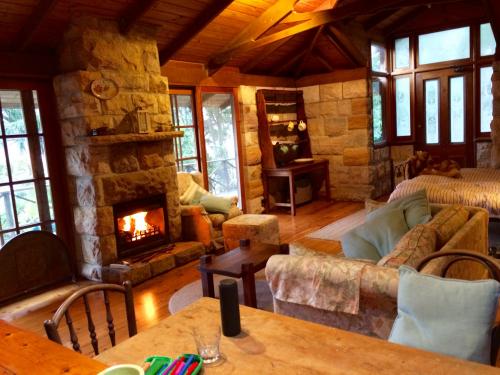A cabin in the woods: Creating insights can help clarify purpose and passion
In his recently announced innovation statement, Prime Minister Malcolm Turnbull called for an ‘ideas boom’. But what can we do for these elusive “a-ha!” moments to occur? Leah Sparkes explains why it’s important to make time to think and reflect.
A cabin in the woods. Wood smoke trailing into the sky. Such a classic notion. A place of solitude. To withdraw from the world, to think and to reflect.
I recently did just that.

I found a beautiful sandstone one-room cottage set in the Pittwater (Lovett Bay, for those who know the area) and accessible only by boat. Just me, my books and my notepad for 30 hours of solitude. Total bliss.
There was one exception – the wallaby that would loiter at the end of the deck. Each time I stepped outside, he bounded off in one direction and I fled in the other. Eventually we got used to each other and things settled down.
Making time to think and reflect
This escape from life came from a strong urge for some space to clarify my purpose and get creative about how to grow my business. I had to ask myself some important questions about work and life, and I needed time to reflect on the answers, away from the ‘noise’ of my regular routine.
I can honestly say that while I have taken an hour or two for myself here and there, I have never carved out substantial time for the specific task of thinking about important questions.
As the ideas and insights bubbled up, it occurred to me just how important this process is if you truly want to be effective in your work and life. I gained much clarity around the purpose of my business and generated fresh ideas for the way forward.
Now that I am back into the hurly burly of life and work, I can see how important this mini-retreat was for me and why it was so productive.
When creativity and inspiration appear
Cognitive Neuroscientists have been able to help us better understand how creativity and insights arise in our brains and what the ideal conditions are for this to occur.
According to Scott Barry Kaufman, our brains have three kinds of networks that operate when we are trying to solve a problem or come up with a new idea.
The first is called the executive attention network and is used when the problem requires sustained attention and focus, and it involves our working memory to manipulate numbers or facts.
The second network is called the imagination network, also referred to as our default brain mode. When this was active in school, you were probably accused of daydreaming. Your mind is wandering to the past, imagining the future and thinking about others in no particular order. It is mostly activated when we are in a relaxed state and not trying to achieve anything much.
The third is called the salience network, and its job is to monitor the internal stream of thinking versus external demands. It calls on the network most required for the task at hand.
The research suggests that while all three networks are involved in the creative process, it is the second two that are most involved when the “a-ha!” moments occur or when a new idea is generated.
The executive attention network is involved as you get clear on what the question is, what data is needed and the research is gathered. Then, when your default brain mode (the imagination network) is on, the answer suddenly comes out of the blue (often when you are in the shower or walking the dog). I am sure you know this phenomenon – that sudden solution to a problem that emerges when you least expect it and are not looking for it.
Conditions for gaining insights
Dr David Rock has also undertaken much research on insight and getting to the “a-ha!” moment. He has identified four key conditions that he believes will improve your chance of gaining insights by more than 500 percent.
- Quiet: Insight is often the result of connecting long forgotten memories or ideas with a current problem or question. In order to give ourselves access to the items deep in the memory banks, we need a quiet mind so we can ‘hear’ the connection as it happens, because it is often a quiet, subtle occurrence. When our minds are busy and noisy, we are much less likely to ‘catch’ it when it happens.
- Inward looking: To look inward means to be unfocused on external events or new information. By shutting out new external inputs, we made a space for this new connecting of ideas and memories to take place.
- Slightly happy: When we are happy, as opposed to anxious, we are more likely to notice new and different things. So feeling happy opens up our awareness, as opposed to the narrowing of focus that occurs when we are worried. It follows that cultivating a brain state that is open and curious will enhance the creative process.
- Not effortful: This final condition may be the biggest surprise. Basically, the harder you try, the less likely you will come up with original ideas or insights. This is partly because when we try hard, it stimulates increased activity in our brain, which is not the quiet spaciousness we need. It also forces our brain to come up with something, which might possibly be a ‘wrong’ solution and not the most creative one. Trying too hard will also cause a narrowing of our focus, not the open, free-ranging type of brain activity that has been shown to be the source of great creativity. Gaining insight and generating new ideas should not be effortful.
“Creativity is the residue of time wasted.” Albert Einstein
A natural discovery
As I think about my time in the woods, I am rather pleased with myself. I came armed with questions and a little research. I found a beautiful, tranquil space far removed from technology and people so that I could be quiet and inward-focused. And I was happy with the picturesque sandstone cottage and stunning views over the water.
The most fulfilling part was that the hard work occurred as I lazed around and went on peaceful walks to the nearby waterfalls – and I did this while my unconscious duly delivered the goods.
Perfect.
I highly recommend finding your own cabin in the woods because it’s not only a restful experience but it also allows for important insights and clarity to emerge. In our overloaded and hyper-connected world, we all need time to think and reflect.
Even if you cannot get to a cabin, you can apply some of the principles and create these conditions at home or at work to encourage new ideas to emerge.
So what question do you need to ask yourself right now? And can you give yourself the space to find the answer or rather let the answer find you?
Leah Sparkes is head of Candeo Consulting. She has always been fascinated by what makes people tick and helps them flourish. Leah has a BA in Business and studied Psychology at the University of Technology in Sydney. She has also studied with the Institute of Executive Coaching & Leadership and the NeuroLeadership Institute. Over the last eight years Leah has worked with many executives, coaching them on and in their career, supporting them in areas of leadership development and personal growth. She is active on LinkedIn. Leah@candeo.com.au














